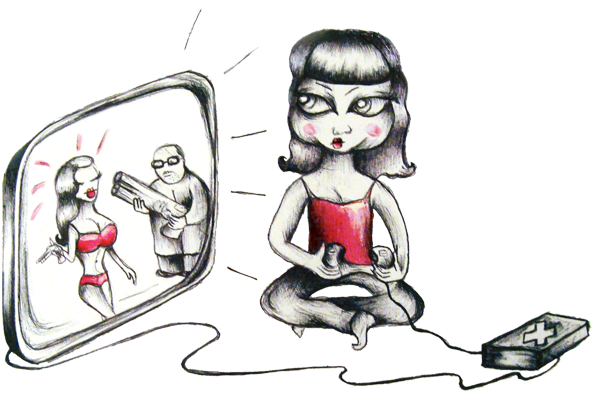I’m back! After a semester hiatus, I’m thrilled to be back in the mix.
Dr. Craig Anderson, a Professor at Iowa State, has made his career on proving the negative effects of video games on youth. He is the figurehead for this movement, and he is the primary source and citation for anyone wanting to show that video games do indeed cause violence. He has a prolific publishing career, continually churning out a slew of debatable, dubious studies as “proof” that games cause violent tendencies in children and adolescents.
I am cognizant of the fact that when I present research on the other side of this “issue” or “debate,” I am shoring up the notion that there is something to be debated. This is not the case. Far more research, from far wider and more credible sources than this crusader, has proven indefinitely that the link between playing video games and an increase in violent behavior is a myth at best and that quite possibly the inverse is true (see “Violent Video Games and Real-World Violence: Rhetoric Versus Data” by Markey, Markey, and French).
Here is how all of Anderson’s “studies” work, and why each step is dubious and problematic.
- He observes a small sample of kids playing a violent game and kids playing a nonviolent game.
There is no mention of whether the “violent” game has an ESRB rating that would make it inappropriate for the violent game group in the first place. If the kids in the violent game group are playing a game rated M, which it most likely is if it’s violent, then the study can only show a link between violence and allowing kids to play above their ESRB level. This is not an interesting find. If I give a 7 year old an R-rated movie, she will likely be scared when she watches it. This does not disavow R-rated movies, but only proves that we should follow established guidelines.
- He observes what he calls “small aggressions” in the children playing the video games, which are mostly absent in the children playing nonviolent games.
Two things. First, the studies that show these “aggressions” typically measure children’s aggression by allowing them to play short noise bursts against their opponent. Or they have kids play a violent video game, and then let them decide how much hot sauce a person who doesn’t like hot sauce gets on their food (I’m not kidding, noise bursts and hot sauce are 100% of the cornerstone to Anderson’s theories of aggression). Needless to say, the way they measure aggression is completely unstandardized. Even so, just as many studies show no difference in how much noise or hot sauce violent game players v. non-violent game players subject their opponents to, and some studies find violent gamers are less “aggressive.” Second, violent and non-violent games are often fundamentally different. My heart doesn’t race while playing the Sims like it does for COD. I don’t throw the controller or swear out loud (also markers of “aggression”) when playing Sims. However, is the Sims less violent than COD? It’s slower, more methodical, but as a friend of mine has shown, you can commit diabolical acts of murder in the Sims. The entire notion that a fast paced game where you shoot or punch people is the epitome of a violent game is questionable. The fact remains that games allow you to play at that fast-paced violence, the slow diabolical violence, scheming or sabotaging, or any number of things. My games of Monopoly ended far more violently than my games of Mortal Kombat ever did. At the very least, studying “aggression” in such an undefined, illogical way, coupled with the poor definition of what makes a game violent, it a problem here.
- He defines violence as the extreme of aggression, thus the possibility of real-world violence is raised if the possibility for aggression is raised.
This is the major claim that has been unequivocally disproven, and one Anderson has backed off from in recent years. This claim, and the reason parents so firmly believe in it, stems from one thing: kid plays fighting game with a friend, then they go outside and mimic moves they saw in the game. So, many, things, wrong, with, this. First, play fighting is not an indicator of violent behavior. Whether it’s on the screen or in person, play fighting is still play fighting. That’s the same as saying when I played cops and robbers as a kid that I was more likely to shoot someone when I grew up because I played at it. Yes, your kid may be wound up after playing a fast-paced game. Is that because they’re more violent now? Or perhaps that’s an indication that they need exercise because they’re been sitting and playing games. Is it an indication that the game altered their behavior to make them fundamentally more violent? That’s fucking absurd. And unproven. In fact, studies like the one I linked above (more can be found here), have shown the opposite. They’ve proven that playing at and acting out violent ideas, fantasies, and behavior, leads to a decrease in actual violent behavior and crime in life.
The research is coming primarily from one person, it’s dubious, and most other researchers have discredited Anderson’s findings and methodologies. Why, then, do so many people still believe violent games cause violent kids? Is it easier to blame a game than look at other factors influencing a child? Is the immediacy of it just too easy? Out of 22 students in my Children, Adolescents, and the Media: The Culture of Video Games class, 10-12 each semester firmly believe Anderson’s claims. They write research papers citing these dubious studies, and they point to cases like Slender Man and their own kids play fighting after gaming as evidence. Every time I tell someone I study games, the “way games make kids violent” is one of the first topics that come up. How can we move passed this?
In the wake of things like #GamerGate, where real and threatened violence is being done against women, and things like swatting, I’m not sure what we do to debunk these studies. The gaming world is violent for a lot of us. Perhaps not more violent than any other community, but it certainly is volatile, especially if you’re a woman or someone who speaks up for women. Can we, or should we, fight the battle against this debunked notion that games cause violent behavior when the news headlines are about how gamers threatened to beat and rape Anita Sarkeesian for pointing out that constantly saving a princess is lame? Particularly when it comes to teaching a class about kids and video games, where should our energy be?




